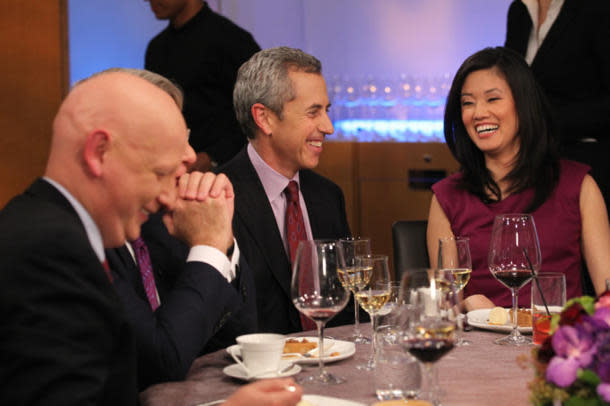 The Cutline
The CutlineBloomberg tries a dinner setting for its new primetime show

On a seasonably cold Monday night in Manhattan earlier this month, four hedge fund managers--who oversee more than $20 billion in assets between them--gathered in a private back room of The Modern, Danny Meyer's bustling, upscale restaurant adjacent to the Museum of Modern Art.
They dined on Alaskan king crab salad and foie gras terrine, beef tenderloin with butternut squash, venison loin and chestnut petit beurre. Over several bottles of wine, they discussed big spending and big banks. Even Meyer himself made a table-side appearance at the end of the two-and-a-half-hour meal to discuss his various restaurant investments.
But this was not your typical after-work meet-and-greet between hedge-fund heavyweights. Bloomberg TV cameras were recording the evening for a new primetime show, "Titans at the Table," set to debut Thursday at 9 p.m.
The dinner atmosphere was a way to get buttoned-up hedge fund types to open up. But the show also underscores the fundamental challenge all business networks face: getting its day-trading viewers--their TVs fixed on CNBC, Bloomberg and the fledgling Fox Business network all day--to stay tuned in at night.
At dinner, Steve Kuhn, head of fixed income trading at Pine River Capital Management, said the mortgage crisis had been "wonderful" for his business, eliminating competitors like Fannie Mae and Freddie Mac. Mike Novogratz, a hard-working, hard-living macro trader and president of Fortress Investment Group dressed in lime green slacks, discussed the "hedge fund hell" of the fourth quarter. Jim Chanos, a short-seller famous for being early on Enron, talked about being bearish on China. And Jamie Zimmerman, founder of hedge fund Litespeed Management, spoke up as the lone female voice in a sea of men.
"When you're interviewing someone on a set, you tend to get canned answers," Andrew Morse, head of Bloomberg's U.S. television operation, told Yahoo News in a recent interview. "With the dinner setting, we're hoping to get something much more intimate, more unplugged, more personal—and ultimately different."
The show, conceived by Bloomberg "In the Loop" anchor Betty Liu, who also hosts "Titans," is currently planned as a quarterly special, mainly because the logistics of booking A-list dinner guests is no easy feat. (In fact, most of the three months it took to produce "Titans" was spent coordinating the executives' tightly-packed schedules, said executive producer Courtney Chapman.) Getting them to open up in a taped, on-the-record discussion actually proved much easier than scheduling. "We'll just keep feeding them wine," Liu said before the shoot.
The dinner had a decidedly reality-TV feel to it, and that may be partly the point.
Last year, CNBC averaged 228,000 total viewers a day, according to Nielsen estimates—most of them while the markets were open. Fox Business averaged 54,000 over the same 12-month period. (Bloomberg TV, available in more than 300 million homes, is not rated by Nielsen.)
On Feb. 9, Fox Business canceled its entire primetime lineup, replacing a three-hour block of shows with repeats of earlier airings of "The Willis Report," "Cavuto" and "Lou Dobbs Tonight." The day before, CNBC announced the hiring of Jim Ackerman, a longtime VH1 reality show producer, as a senior vice president of "primetime alternative programming"—i.e. reality shows.
Bloomberg isn't ruling out doing the same.
"Would we do 'Desperate Housewives of Wall Street?' said Morse. "No. But there's room in the reality genre for evocative, well-told stories. It's just a different way of storytelling."
Morse, a former producer at ABC News' "Nightline," added: "We have 1,440 minutes of programming a day—I would never say never to anything."
Like CNBC, Bloomberg TV is experimenting with longer-form programming in an effort to attract viewers in the evening hours. (In January, Bloomberg hired Trish Regan, who conceived and hosted CNBC's highest-rated special of all-time, "Marijuana Inc.: Inside America's Pot Industry.")
And while "Titans at the Table," reminiscent of IFC's short-lived "Dinner For Five," may be a conceptual departure for Bloomberg, it is "not thematically too different from what we do," Morse said.
In 2011, Bloomberg TV produced more than a dozen live prime-time specials, including the Republican presidential debate at Dartmouth College in October, special programming on the deaths of Steve Jobs and Teddy Forstmann, and special live coverage of the S&P downgrade, European financial crisis and the News Corp. phone-hacking scandal.
Some have criticized the cable business networks like Bloomberg for dabbling in politics and seeking out news real estate occupied by the likes of CNN and Fox News.
"That's not the game we're in," Morse said. "We're not covering the horse race. But we'll cover the economic side of it, because it impacts the business and financial world."
Still, Morse conceded: "That definition is broadening every day."
Other popular Yahoo! News stories:
• He's back! Stephen Colbert addresses rumors about his absence
• PETA defends controversial vegan ad: 'The underlying message is a helpful one'
• CNN cancels GOP debate after Romney and Paul drop out

